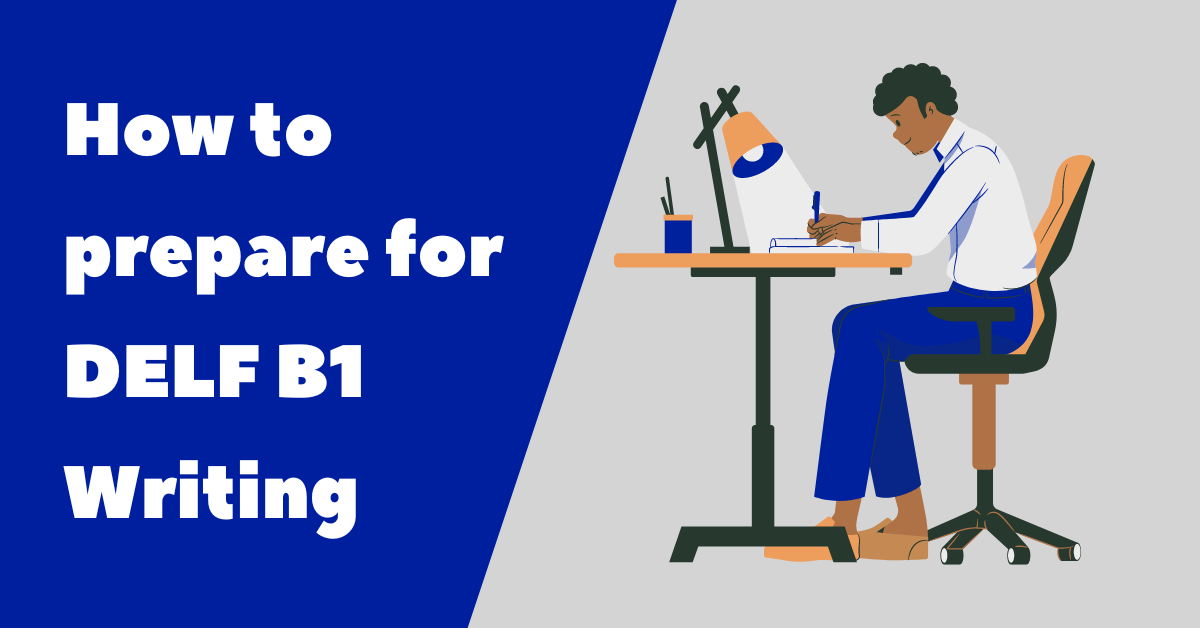Bonjour! Ready to elevate your French skills? If you’re gearing up for the Diplôme d’Études en Langue Française (DELF) B1 exam, you’re in luck! Get set to jot down some valuable tips because we’re about to equip you with everything you need to conquer the DELF B1 Writing Test!
From essential strategies to practical tools, we’ve got you covered.
Format and Time Allotted for DELF B1 Writing Test
In the DELF B1 writing test, they’re going to ask you to share your opinion on something related to education or work. You’ve got to write one solid piece, about 180 words long, in just 45 minutes.
Now, don’t panic about the time – it’s enough if you manage it well.
Here’s the deal: you need to be able to describe things clearly, and share your thoughts and emotions, all in one cohesive text. They might ask for an essay, a letter, or an article.
So, it’s essential to know how to structure each type and how much time to allocate for each part.
First, take a few minutes to plan what you will write. Then, start with a clear introduction, move on to your main points in the body paragraphs, and wrap it up nicely in the conclusion. Remember, clarity is key – make sure your ideas flow smoothly.
And don’t forget to leave some time at the end to review your work for any mistakes. With a bit of practice, you’ll get the hang of it.
Scoring Structure of DELF B1 Writing Test
The total score is 25 points. The scoring in the DELF B1 Writing test is divided into a few key areas: remember them!
First up, we’ve got Cohesion and Coherence. Think of cohesion as the glue that holds your ideas together. You’ll score 13 points based on how well your writing flows logically and smoothly.
Make sure your paragraphs connect well, and your ideas follow a clear order. It’s all about making your writing easy to follow. You can use connector words for segregating the parts of the writing as well as to build a good flow.
You can refer to: Connecteurs logiques
Next, we’ve got Vocabulary skills and spelling.
This is worth 6 points, so it’s essential to pick your words wisely. Show off your range of vocabulary, but make sure you’re using the right words in the right context. Spelling also matters, so double-check your work to avoid any slip-ups.
Lastly, we’ve got Grammatical skills and spellings.
Another 6 points up for grabs here. Grammar might not be the most exciting part, but it’s crucial for clear communication. Watch out for verb tenses, sentence structure, and agreement between words.
Again, keep an eye on your spelling – those little mistakes can add up. It is advisable to provide at least one sentence with subjonctif and one with conditional tense.
Preparation Plan for DELF B1 Writing Test
- Understand the Format: Know the specifics of each task type you’ll encounter, such as writing emails, filling out forms, or crafting essays. Look at past exam papers to understand the expectations for each task and how they’re scored.
- Practice, Practice, Practice: Write about the range of subjects in the syllabus to ensure you’re comfortable with various themes that could come up in the exam. Challenge yourself to write a certain number of words or paragraphs each day to build stamina and fluency.
Expand Your Vocabulary: Instead of just memorizing lists of words, learn new vocabulary in context by reading articles, books, or watching French media.
Create mnemonic devices or associations to help remember new words and their meanings more effectively.
- Grammar Matters: Focus on tricky grammar topics such as verb conjugations, pronoun usage, and agreement rules until they become second nature. Analyze your past writing to identify recurring grammatical errors and dedicate time to correct them. Incorporate grammar exercises into your study routine to reinforce concepts and improve accuracy.
- Time Management: Set a timer and practice completing writing tasks within the allocated time to build speed and efficiency. Identify which tasks you find most challenging and allocate more time for those during practice sessions.
- Mock Tests: Replicate the exam environment as closely as possible during practice sessions, including timing and test instructions. Use mock tests to pinpoint areas where you struggle the most and focus your efforts on improving those areas.
Materials for DELF B1 Writing Test Preparation
Let’s dive into the materials you’ll need to ace your DELF B1 writing test!
First off, the Réussir DELF B1 book is like your trusty guide. It’s packed with exercises, tips, and practice tests specifically tailored for the DELF B1 exam. Make sure to go through it thoroughly, especially the writing sections.
Take your time to understand the sample articles and letters along with the structure they follow. Pay attention to grammar points and vocabulary used – they’ll come in handy during your writing.
Next up, we have the Cosmopolite 3 textbook.
This resource is fantastic for brushing up on your French skills overall. While it may not be geared solely toward exam preparation, it offers a wide range of topics and exercises that can help improve your writing fluency and comprehension. Use it to supplement your studies and broaden your knowledge base.
And let’s not forget about online resources. The internet is a goldmine of helpful tools and materials for language learners. Websites like Quizlet and FluentU offer interactive exercises, flashcards, and video lessons that can reinforce your writing skills.
You can refer to this link for paid online resources: Prepmyfuture
So, mix and match these resources according to your learning style and preferences. With the right materials and dedication, you’ll be well on your way to acing the DELF B1 writing test!
Conclusion
As we wrap up, remember that preparing for the DELF B1 writing test is all about consistency and using the right tools.
With determination and effort, you can conquer the DELF B1 writing test and take a big step forward in your French language journey.
So, keep studying, keep practicing, and you’ll soon be celebrating your success!
Bonne chance!





